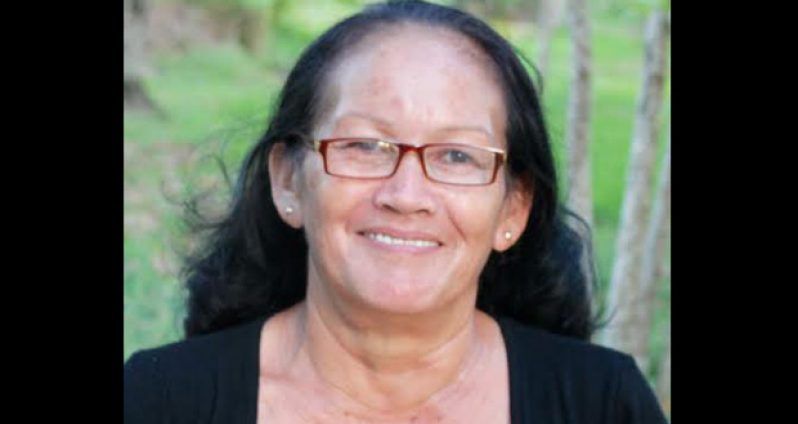By Telesha Vidya Ramnarine
MISS Elizabeth Abraham, well-known in Kato, Region 8 (Potaro/Siparuni) as ‘Ms. Liz’, gave 40 years of quality service to the teaching profession in Guyana, and despite retiring as head teacher two years ago, she continues to operate as though she is still on the job.

“Children still approach me for help with their school work. I also assist the wider community in whatever way I can, like writing correspondences, and doing voluntary community work. If the Toshao needs advice or suggestions, I try my best to contribute in this way also,” she told this publication recently.
Ms. Liz, 57, was born and raised in Kato after her father, Mr. Francis Gomes, of Region 1 (Barima/Waini) went to Kato as a teacher and preacher, and met her mother, Priscilla.
In her days, there was no secondary school in Kato and so Ms. Liz only managed to secure a primary education. Growing up, she wanted to become a nurse but she did not meet the criteria due to the limited circumstances available back then.
After writing the ‘School Leaving Exams,’ she opted for the next best thing teaching. In 1974, she worked as a voluntary teacher for three months until she was appointed.

Ms. Liz taught for two years at Chiung Mouth Primary School, located about 15 miles from Kato, and spent the rest of her time at the primary school in Kato. Approximately 12 years after starting to teach, she was afforded the opportunity to be trained at the Cyril Potter College of Education (CPCE) in Georgetown.
She was officially appointed head teacher in 2004 but had been carrying out those functions ever since the 1980s.
Even after retiring, Ms. Liz spent the next three months working with the children on a voluntary basis.
“I have no regrets, spending more than 40 years in the teaching profession,I have had an impact on many young lives. For example, the final batch of Grade Six students that I taught completed secondary school this year, each securing grades at no less than five subjects.”
The only regret Ms. Liz has is that there are still no job opportunities and training being extended to these young ones. “Many persons

in the interior live in poverty and we all know that the only way out of poverty in this system is a good education.”
The Patamona Dialect
Starting her teaching career at just the age of 16 was not the easiest thing for Ms. Liz. She recalled waking up at 3:30 am each day to plan her lessons for the school day. A number of things made her work especially challenging. For one thing, she was the only teacher at the school who knew the Patamona Dialect. (Each Amerindian tribe has its own dialect)
“We used to get teachers from the coastland who couldn’t speak the dialect, so that is where I had to do a lot of hard work. Many of the children wouldn’t know English so I had to serve as translator on many occasions for those teachers.
“When I started, there were only two coastland teachers and they didn’t know Patamona, so they couldn’t effectively communicate with the children. I even had to provide all the explanations to parents at the PTA (Parent/Teacher Association) meetings.”
Ms. Liz said her father was a big help as far as her learning English was concerned. “He never wanted me to speak Patamona, even at home, because he said when the exams came, nothing would be in Patamona. But I couldn’t escape learning the dialect. So I knew both,” she explained.
Though the language barrier posed many challenges, Ms. Liz said the best thing about it was seeing the children, who knew nothing in English, being able to learn and speak the language. This gave her great satisfaction and made her hard work worthwhile.
“I am happy to see children who knew no English at all being able to express themselves in English at the end of the first term of their first year in nursery. What was funny was that when I spoke to them in the Patamona dialect, they looked at me full in the face and answered in English as if asking what was wrong with me.”
Another challenge she had to endure was the attitude of some parents who reacted negatively when discipline had to be administered to their children, and who took no interest in their children, once they were home from school.
“In those days, I felt like quitting sometimes. But my dad was of great encouragement and he told me not to leave. I believe parents in Kato ought to do more for their children; they would do much better that way,” she posited.
Not about the pay
Today, it is as if Ms. Liz is on a continuous vacation. “Life is so good. I’m at ease. I’m just relaxing and enjoying every day, especially with my (eight) grandchildren.” She is mother to Alita, Keith, Karen, Delon, Lysbeth and Larissa.
Asked if she would consider teaching again upon completion of the Kato Secondary School, Ms Liz said she would definitely not mind if she was requested to.
“I believe that a good teacher is one who feels a sense of accomplishment when they see their students succeed; it’s not just about the pay. They put the interest of the children ahead of their own.”




.jpg)










